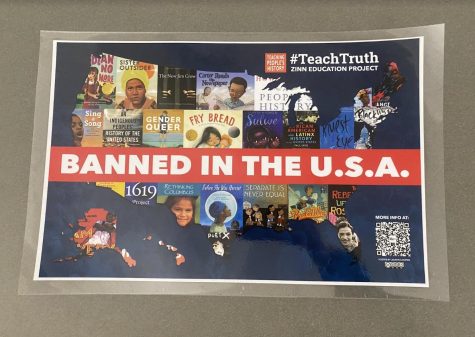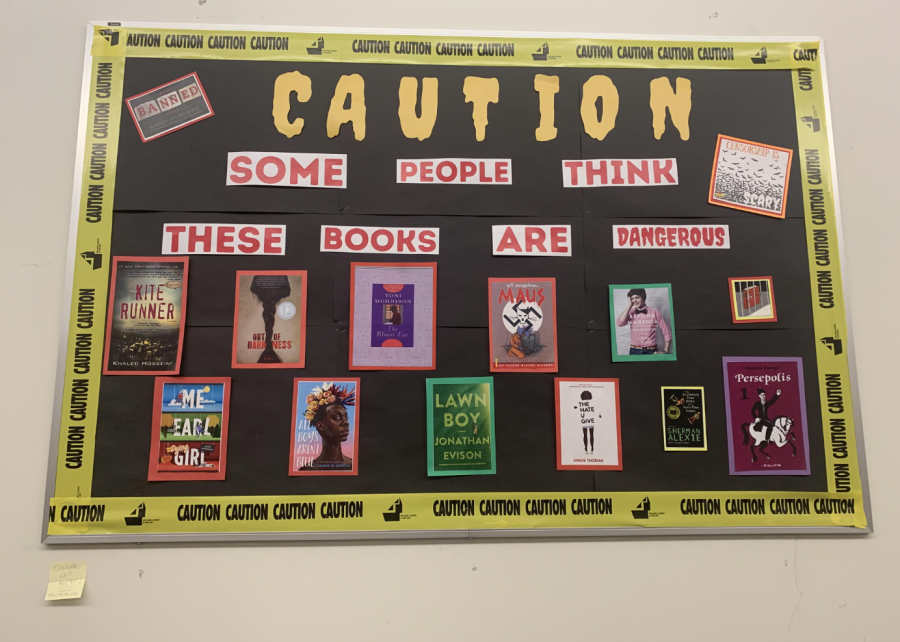Your donation will support the student journalists of Wayland High School. Your contribution will allow us to purchase equipment, cover our annual website hosting costs and sponsor admission and traveling costs for the annual JEA journalism convention.
WHS bands together to protect banned books
May 6, 2023
Credit: Jennifer McGillis
Many schools around the country ban books each day. WHS has no banned books, and even had a display in the library, encouraging students to take out banned books this past September.
At this very second, books are being banned across the country. But WHS teachers, students and librarians have been defending these books for years. While books such as “The Bluest Eye,” “Catcher in the Rye” and “To Kill a Mockingbird” are being taken out of libraries and curriculum around the world, WHS continues to keep them in the English curriculum.
Not only are banned books taught as part of the English curriculum, the books are also available to any student at the Wayland High School library. This past September a banned book display was put at the front of the library.
“The Wayland High School library proudly has many of the traditionally banned books and newly banned books,” WHS librarian Jennifer McGillis said. “We believe everyone has the right to read what they want to and that nobody should be censoring what anybody is reading.”
Banning books forces teachers to stop teaching books deemed inappropriate for students, removing the book from school libraries and classrooms until it is completely inaccessible. English teacher Kelsey Pitcairn only sees harm in this. She believes reading banned books can only make for better conversations and learning in classrooms.
“One of the benefits of reading fiction is engaging with dangerous, uncomfortable and difficult things in a safe space,” Pitcairn said. “These situations happen in the real world, ignoring them in books doesn’t mean they stop in real life.”
While many other schools have banned the novel, Pitcairn decided to teach the book, “The Bluest Eye” by Toni Morrison to her AP English Literature classes. Pitcairn selected this book around the time of Virginia’s 2022 gubernatorial election. At this time, Virginia’s top Republican candidate publicly announced that the book, “Beloved,” which was also written by Toni Morrison, would most likely be banned if he were elected. Growing up in Florida, a state with one of the most widespread book bannings, Pitcairn decided to take matters into her own hands.

“I had been planning to teach something else, but then I thought, ‘No I am going to teach “The Bluest Eye”‘ because Toni Morrison deserves to be taught,” Pitcairn said. “I hope to see people stop banning books because I think it goes against our constitutional foundation, it goes against my own sort of progressive politics and it goes against what I think the value of literature is.”
Books can be banned for a variety of reasons. Different towns in different states can choose their specific reasoning to ban a book.
“A lot of the books that are banned deal with LGBTQ+ and race issues,” McGillis said. “These books are popular because of their subject nature and we have a lot of students who relate to them. Taking those away takes away from students basically tells them that they are banned.”
Senior Bryn Leonard is in Pitcairn’s AP English Literature class this year. Leonard is currently reading “The Bluest Eye” in class, but she also has read “To Kill a Mockingbird” and “The Catcher in the Rye” during her WHS English education. She has also read banned books in her free time. These books include, “Stamped: Racism, Anti-Racism, and You” by Ibram X. Kendi, “The Perks of Being a Wallflower” by Stephen Chbosky and “The Handmaid’s Tale” by Margaret Atwood.
“I feel that, frankly, all books deserve a chance to be read, even when they include sensitive topics,” Leonard said. “We aren’t able to improve or grow as students if we stay away from stories that are controversial.”
Throughout her time teaching, Pitcairn has only ever seen growth in the number of students that read the book if it is banned.
“[Teaching banned books] is honestly a benefit for teachers,” Pitcairn said. “It’s sort of the allure of the contraband that makes students wonder what is so dangerous about this book and want to read it.”
Pitcairn, Leonard and McGillis all hope that students at other schools work to get books unbanned. Pitcairn believes that as younger generations grow up, they will work together to dissuade schools from banning books. Similarly, Leonard believes students should attempt to get books unbanned by protesting and attending hearings where challenged books are being discussed.
“I very much feel it is very important for books to not be banned because you never know if that book is going to help someone,” McGillis said. “To ban the book is basically banning their experiences and what they need.”
Throughout McGillis’s time working at WHS, she has read several banned books herself and recognizes the importance of reading different genres of books.
“There is this saying in the library world that we want books that are windows and mirrors,” McGillis said. “We want a window so we are able to look at other experiences and experience the world through different perspectives, and you also want the mirror to see your own perspective.”
Pitcairn hopes that teaching these books will not only educate students on various topics, but it will also empower them.
“I hope that students realize that they have just as much of a say in how they interact with these books as their teachers do and as much as the people that are trying to ban them do,” Pitcairn said.
During the 2021-2022 school year, more than 2,500 books were banned. But as the numbers rise around the country, WHS still continues to keep all books on their library shelves and allows teachers to teach whatever books they want.
“Books are being banned every year, and censorship of books is a very prevalent issue,” Leonard said. “I think it’s important for students to read banned books because it allows for much needed conversation on controversial and taboo topics that may have not been brought up otherwise.”

Sara Snow • May 8, 2023 at 8:41 AM
It’s interesting to read about books that have been banned from libraries and added to English curricula. I wonder whether we can look at the issue from a different perspective and think, too, about books that have been removed from curricula and authors who are no longer deemed relevant.